Life and Achievements of Sir Winston Churchill
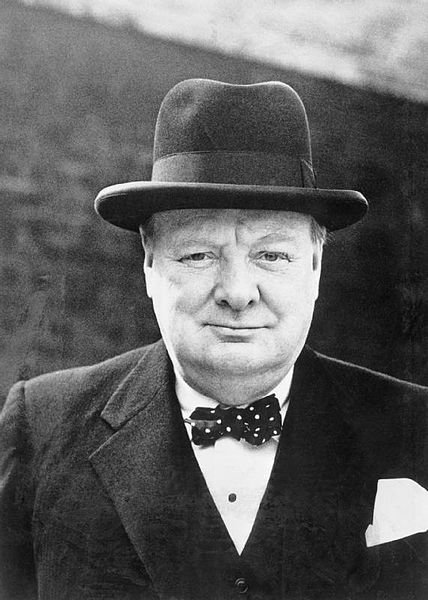
Winston Churchill life and achievements
Largely regarded as Britain’s greatest statesman of the 20th century, Sir Winston Churchill rose to critical admiration for his brave leadership during World War II (1939-1945). Serving in his first term as Prime Minister of Britain (1940-1945), Churchill’s political and military brilliance was on display as he rallied the rest of Europe and the U.S. in securing victory over Nazi Germany and the Axis forces. In this article, we present the illustrious life and stellar achievements of Sir Winston Churchill- Britain’s greatest modern icon.
READ MORE: 10 Greatest Prime Ministers of the United Kingdom
Winston Churchill’s Childhood
On 30 November, 1874, Winston Leonard Spencer-Churchill was born in Oxfordshire to aristocratic parents- Lord Randolph Churchill and Lady Randolph Churchill (Jennie Jerome). The exact place of Winston Churchill’s birth was at the Blenheim Palace, Oxfordshire, England. The palace belonged to his grandfather, the seventh Duke of Marlborough.
His father, Randolph, was an influential member of parliament in the Conservative Party (the Tories). On the other hand, his mother, Jennie, was an American heiress who came from a family of business tycoons, financiers and horse racing lovers. Churchill’s parents weren’t the closest of couples- they lived a very estranged life together. Regardless of this, Winston had a closer relationship with his mother than his father.
Winston and his other sibling, Jack, were predominantly raised up by Mrs. Ann Everest (Churchill’s nanny) and his grandparents at Blenheim. Mrs Everest was a spinster who devoted a great chunk of her life to raising the Churchill boys. In his later autobiography (My Early Life), Winston named Mrs Everest (commonly called “Voom”) as having a substantial influence on him during his childhood. Even up to this day, the Churchill family pay for the maintenance of Everest’s grave.
Schools that Winston Churchill Attended
Along with his other sibling (Jack), Winston attended Ascot boarding school and Harrow School (in April 1888). During his stay in boarding schools, he often got on the wrong side of the school authorities due to his rebellious tendencies. Although clever, he was not the most disciplined of the lot, and his dislike of formal education was palpable. According to Churchill, his boarding school days were full of unhappiness and misery.
Winston Churchill’s free-spirited life hampered his grades. He did however favor subjects like English language, French, poetry and history. He also took great delight in horse riding and swimming. At the age of 17, Winston won a local fencing championship.
His grades at Harrow School were at best average, and chances of him gaining admission into the university were very slim. After three attempts, Winston finally secured a place as a cavalry cadet at the officer training school (the Royal Military College) at Sandhurst. After he graduated from the military college (in 1894), he was assigned as a second lieutenant (cornet) in the 4th Queen’s Own Hussars at Aldershot.
His time as a young soldier and his brave military achievements abroad
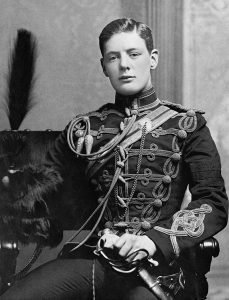
Winston Churchill’s days at the Royal Military Academy (1894)
Just a month before Winston became a cavalry officer , his father, Lord Randolph Churchill died, aged 45. Although, the relationship with his father was sometimes cold, his father’s passing still weighed heavily on Winston. But it also served as an opportunity for the young Winston to his leave his mark on this earth.
As a cavalry officer, Winston relished the chance of serving in the most dangerous of places in the British Empire. And when on such perilous military campaigns, he took to chronicling his activities and times.
In a space of about 5 years, Winston would visit countries such as Cuba, Afghanistan, India, Egypt and Pakistan. Serving as a military correspondent, most of his articles and stories about his daring campaigns between 1896 and 1900 were published in books and newspapers.
Cuba Mission
In 1895, Winston chose to spend his 5 months’ leave from the British Army in Cuba writing for the Daily Graphic about the Cuban War of Independence (1895-1898). His original destination should have been the West Indies, but he decided not to go there. Rather, he reasoned that he would achieve great heights in Cuba as a war journalist. It was in Cuba that the courageous and adventure-loving Winston got shot. The incident was not fatal, and Winston made his way back home to England.
Time in India
After Cuba, Winston got transferred to India in 1896. He reprised his role as a war-correspondent in the North-West Frontier Province. It was around this time that he started working on his first novel: Savrola: A Tale of the Revolution in Laurania. The novel was very popular in Britain. It set Churchill on a path of critical acclaim and admiration in the literature community as well as in the general public.
The following year, in 1897, Winston Churchill was part of the British troops that faced off with Pashtun tribe in Malakand, Pakistan. He chronicled the events of the war in his 1898 book – The Story of the Malakand Field Force.
The Sudan and South Africa
Under the command of Gen. Herbert Kitchener, Winston Churchill carried out his duty gallantly in the 1898 Battle of Omdurman, present-day Sudan. The battle was one of Britain’s last wins using a cavalry charge.
After Sudan, Winston briefly took a break from the army and returned to England in May 1899. However, when the Second Boer War broke out between British forces and Dutch soldiers in South Africa, Winston rescinded his resignation from the army.
He went on to serve as a volunteer/war correspondent in South Africa (the South African Light Horse) for the Morning Post. During his coverage of the Boer War (1899-1902), Winston got captured and imprisoned by the Boers. He boldly orchestrated a daring escape from captivity and returned to England to a rousing welcome. The details of the Boer War and the story of his escape were put in his 1900 book, titled- London to Ladysmith.
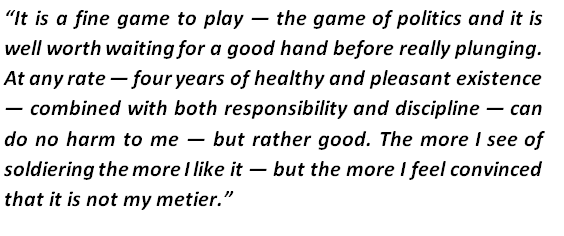
Winston Churchill stating his admiration of politics
Churchill always spoke fondly of his time in the British Army. He even described those years as some of the best years of his life. However, he always saw himself in active politics rather than in the army.
Churchill’s entry into politics
After about 4 years abroad with the military (from 1895 to 1899), the young Winston returned to England to a hero’s welcome. His reputation surely preceded him. Capitalizing on his new found fame, he contested in the 1900 Oldham by-election for a seat in the House of Commons (one of Britain’s second parliament).Unfortunately for him, he was resoundingly defeated.
However, as stories of his gallant efforts abroad continued to spread, Winston’s reputation even grew bigger and bigger. He started going on country wide tours in the UK, as well as in the U.S., giving speeches and lectures. The lectures and tours were financially beneficial to Churchill.
His fame and reputation began to pay off. In 1900, under Conservative Party ticket, Winston was elected to represent Oldham in the British parliament. He was only 26 years old at the time.
His formative years in politics were spent campaigning for reforms that promoted social interventions and economic equity. Examples of such issues that he campaigned on were: the eight hour workday; a government-set minimum wage; a government-run labor regulation office; and a public national health insurance. All of these proposed polices flew against Churchill’s aristocratic roots. As a result, the Conservatives became weary of the young Churchill.
Four years later, Winston moved across the aisle and became a member of the Liberal Party. This happened in 1904.
As a staunch believer in liberalism, Churchill favored issues such as unemployment and housing. These and many more ideas of his were published in his work: Liberalism and the Social Problem (1909). Between 1908 and 1912, Winston Churchill headed the Board of Trade during Lord Asquith’s government.
Brief re-entry into the military
In 1912, Churchill was appointed First Lord of the Admiralty (the department that was in charge of the British naval fleet). During his tenure, Winston ensured that Britain had a very modern navy force that was capable of dealing with the looming war in Europe.
He played a key role in setting up the Royal Navy Air Service. He made sure that the service had the right training and military hardware.
Churchill’s military blunder at Gallipoli
Churchill did not get the desired result that he wanted in the navy. As Secretary of the Navy (First Lord of the Admiralty), Churchill commanded a disastrous invasion in Turkey in 1915. In an attempt to force the Ottomans to the side with Western Allies, Churchill sent British troops to fight the Ottomans at the Gallipoli Peninsula, Turkey.
Britain had gravely underestimated the Turks; and after close to a year of bloodshed, the Turks, led by Mustafa Kemal Ataturk, completely humiliated the British Army and Winston Churchill. A death count of 250,000 soldiers was too big a disgrace for Churchill to handle. Therefore, Churchill resigned from his position in the navy.
Subsequently, Churchill served in various political appointments in Britain. When the First World War broke out, Winston got appointed as the minister of munitions. After the war ended, he was called to serve as the minister of war and air. He was also the colonial secretary from 1919 to 1922.
What was Sir Winston Churchill’s role in the Gallipoli Campaign?
Chancellor of the Exchequer in the Conservative Party
After spending about 20 years with in the Liberal Party, Churchill reverted back to the Conservatives in 1924. Two years later, in 1926, he was made the Chancellor of Exchequer in Stanley Baldwin’s government. His decision to return the British Pound Sterling to the gold standard caused a lot of economic woes for Britain. Britain witnessed the General Strike of 1926 due to this decision of his that he later admitted as a very big mistake.
Churchill’s Response to the menace posed by the Nazi Party in Germany
From 1929 to about 1938, Winston remained relatively quiet in the political arena. But he did work assiduously in sending words of warning to Britain about the threats posed by a budding Nazi Party in Germany. Very few people took him seriously. Instead his Conservative Party was busy licking its wounds from the 1929 general election loss.
The general public and the government in power were perhaps war-tired. Prime Minister Neville Chamberlain even struck several deals with Germany in order to appease the German fuhrer- Adolf Hitler.
Churchill’s warning came to past in 1939 when Hitler went back on his commitment and invaded Poland. Britain and her allies now found themselves in an all-out war with Germany and the Axis. Britain had no one else to turn to other than Sir Winston Churchill during World War II.
World War II Heroics as Prime Minister
The outbreak of World War II in 1939 was Churchill’s cue to return to politics. He was appointed to the position of First Lord of the Admiralty for the second time. Soon, he became the head of the Military Coordinating Committee.

An extract from his first prime minister speech to the British House of Commons
After the resignation of Prime Minister Chamberlain in 1940, Churchill rose up to the challenge and became British prime minister at the age of 66. It was a very dark and trying time for not just Britain but all of continental Europe. Adolf Hitler was on the rampage picking European countries one after the other.
The rest of Europe looked like it would crush under the might of Nazi Germany and Axis forces. If anything at all, very few politicians, if any, in Britain were prepared to take up the prime minister’s job. That was not the case with Winston Churchill. In the mind of the 65 year-old Winston, the time was perfect for him to steer Britain and the Allied forces out of this dark patch.
Winston Churchill remained composed all throughout WWII. Not once did it cross his mind to give into the Nazis. He gave rousing speeches and radio broadcasts to maintain the morale of his soldiers and the citizenry. Without a shred of doubt, this was Winston’s most defining moment. It was as if he was born or destined to lead Britain out of this dark moment.
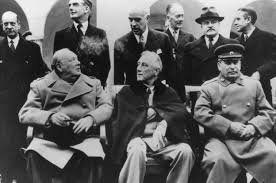
World War Two Timeline | The Big Three – Winston Churchill ,Franklin D. Roosevelt, and Joseph Stalin
Churchill’s years of experience in the army also enabled him to take up the position of Minister of Defense. He brought on board great minds and industrialists to boost aircraft production in the UK.
The relationship he and U.S. President Franklin D. Roosevelt built during those trying times was nothing short of perfection. As a result of this, the United States massively supported Britain and other European allies with military hardware such as guns, tanks, planes and ammunition.
After the Pearl Harbor Attack on U.S. soil, support from the U.S. skyrocketed. Roosevelt and Winston were now in this together; fighting and rallying their troops against Hitler’s Nazi Germany. The two of them coordinated effectively with the Soviets to secure a glorious win against Hitler and the Axis forces in 1945.
MORE:
- World War II: Timeline of Important Events
- Invasion of Normandy: Summary, Significance and Images
- Why Did Adolf Hitler Hate Jewish People?
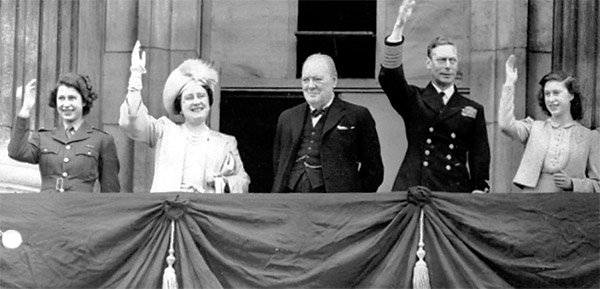
Churchill’s resounding defeat in the 1945 general election
After the war, one would have expected Winston Churchill to easily secure a second term as prime minister. However, that did not happen. Despite his heroics during World War II , Churchill lost the general election of July 1945. The Conservatives could only secure 213 seats in parliament as against the staggering 393 seats won by labor candidates.
British voters were simply looking for a party that would focus on social reconstruction. They were war-weary and felt that Churchill’s Conservative Party was not up to the task of bringing swift repair to the social and economic fabric of Britain.
Churchill’s time in Opposition (1945 to 1951)
During his time in opposition, Winston Churchill continued to play an active role in the British Parliament. He helped rally the British and American public against the dangerous threat that the Soviets could pose if Joseph Stalin went unchecked.
According to historians, Winston’s speeches and actions in the 1950s may have been indirectly responsible for worsening the Cold War between the US and the Soviet Union. Winston Churchill campaigned vigorously for unity in Europe to avert perceived communist dangers from the Soviet Union and Stalin. His public appearances won him favor from the British public.
MORE:
Second tenure as Prime Minister of Britain (1951 to 1955)
Winston Churchill, 77 years at the time, reclaimed the prime minister’s position during the 1951 general election. During his first 6 months in power (from October 1951 to March 1952), Winston was also the Defense Minister of Britain.
Some of his major accomplishments during his second tenure included the Mines and Quarries Act of 1954 and the Housing Repairs and Rent Act of 1955. Using the revenue he was able to generate from increased taxes, Winston granted more governmental assistance and benefits to the British public.
He also tried to build a bridge between the West and the East. But none of his efforts came to fruition. He was the first person to introduce the term “Iron Curtain” to represent the sharp divide between the West and the East.
During his 2nd term as Britain’s prime minister, British forces were in the Korean Peninsula fighting along side their American counterparts in the Korean War. The war was virtually a proxy war between the Soviets and the Americans.
By the mid-1950s, age and stress had begun to take a toll on him. His health was not in the best of shape. In April 1955, Winston Churchill grudgingly resigned his position as prime minister.
After retiring from Number 10 Downing Street, Winston Churchill continued to serve in parliament for about 10 years.
Winston Churchill’s Personal life- Wife and Children
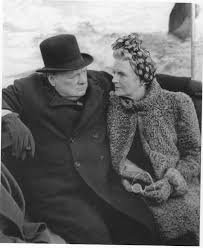
Winston Churchill and his wife, Clementine Hozier (1885-1977)
In 1908, Clementine Hozier and Winston Churchill got married at St Margaret’s in Westminster. The couple had five children: Diana Churchill (1909-1963), Randolph Churchill (1911-1968), Sarah Tuchet-Jesson (1914-1982), Marigold Churchill (1918-1921) and Mary Soames (1922-2014). Unfortunately, Marigold died at an early age of two in 1921.
Churchill and Clementine’s marriage lasted for about 57 years (from 1908 to 1965). The couple had some very rough patches together as Churchill’s busy schedule got in the way of his family life. Regardless of this, Clementine stood through it all. She remained with her husband until his dying breath.
Winston Churchill’s Death
In the latter stages of his brilliant political career, Sir Winston Churchill was afflicted with a major stroke. Prior to that, he was diagnosed with cerebral arteriosclerosis and a brain disorder. The first stroke slightly impaired his ability to speak and move freely. 12 years later, at the age of 90, frail and old now, Winston Churchill had to grapple with another major stroke.
Exactly nine days after this incident, Britain’s greatest prime minister, Sir Winston Churchill passed away at Hyde Park Gate on January 15, 1965. He was 90 years.
The British government gave Winston Churchill a grand state funeral. Many claim that his funeral was the grandest of state funerals the world had ever seen by then. The service was graced by heads of state and officials from about 112 countries. Across the world, tens of millions of people watched the service on their TV sets. It was solemn moment not just for Britain but for the entire world.
Winston Churchill’s Achievements and Legacy
Sir Winston Churchill’s taste of fame came in his mid-twenties with his heroic escape from Boer captivity as well as his numerous brilliant writings and journalism. However, what he is most remembered for was his firm leadership during those chaotic times in Europe. He courageously put up a strong resistance against Axis forces for the entirety of the 6 year World War II.

One of Winston Churchill’s famous quotes.
Even when neighboring countries like Belgium, France, the Netherlands, Austria and other Scandinavian countries panicked in horror, Winston remained resolute and focused. He was determined not to succumb to fascist and anti-Semitic aggression from Hitler’s well-oiled forces.
The outcome of World War II would have certainly been different had Winston not been the prime minister at that time. He was the last line of defense against autocracy and absolute anarchy.
Another very stellar accomplishment of Winston came not in war or politics, but in literature. In 1953, he was honored with a Nobel Prize in Literature for his six-volume history of World War II. An avid reader and writer, Winston was simply an expert at storytelling and historical descriptions. He is credited to have written many commercially successful books and papers.
In a 2002 BBC (British Broadcasting Corporation) poll, the British public (based on a million BBC viewers) voted him as the greatest Briton of all time.
Frequently Asked Questions
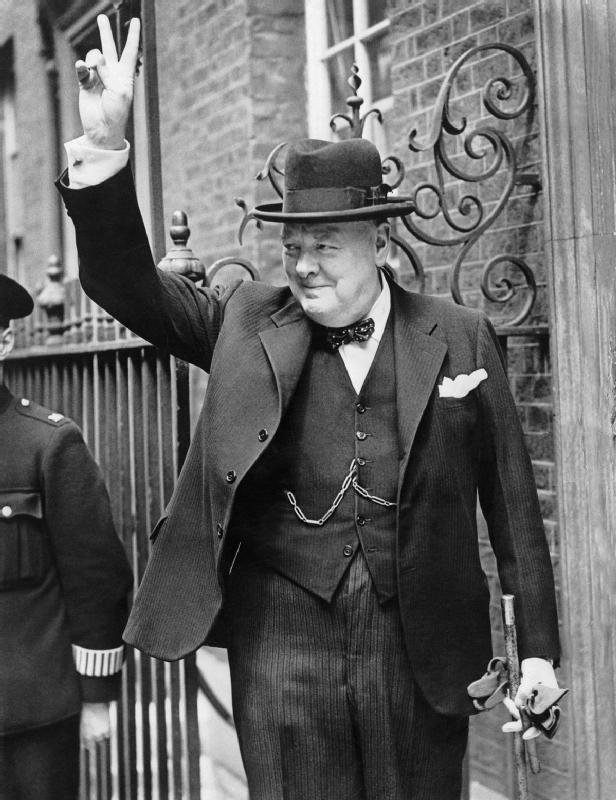
Sir Winston Churchill was a British statesman, military leader, and writer who served as Prime Minister of the United Kingdom during two critical periods in history: from 1940 to 1945 during World War II and again from 1951 to 1955.
What is Churchill best known for?
Churchill is best remembered for his leadership during World War II, rallying the British people to stand firm against Nazi Germany and playing a crucial role in the Allied victory.
Was Churchill always a popular leader?
No. Churchill’s career had its ups and downs. Before World War II, he faced criticism for his role in the Gallipoli campaign during World War I and for his views on various issues. However, his leadership during WWII solidified his place as one of Britain’s greatest leaders.
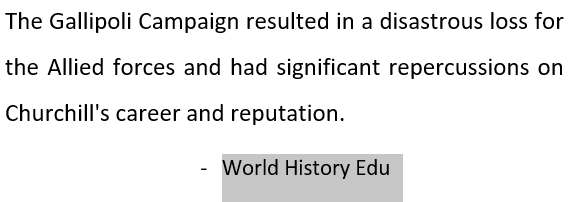
Which political parties did Churchill belong to?
Churchill switched parties during his career. He began as a Conservative, switched to the Liberal Party in 1904, and returned to the Conservative Party in 1924.
What role did Churchill play in World War I?
Churchill served as First Lord of the Admiralty at the start of World War I. He was heavily involved in the disastrous Gallipoli campaign and resigned afterward, spending some time on the Western Front before returning to government.
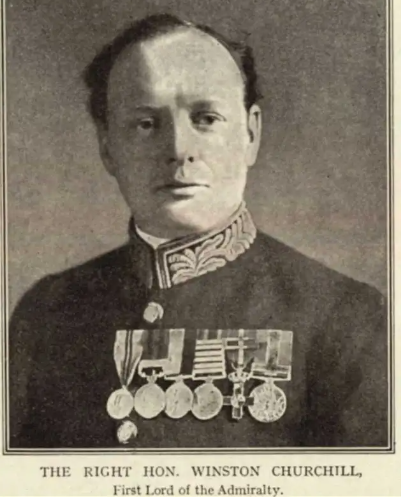
Churchill believed that control of the Dardanelles, a strategic strait connecting the Aegean Sea to the Sea of Marmara, would provide a valuable link to Russia, a critical ally, and would potentially force Turkey out of the war. Image: Winston Churchill as First Lord of the Admiralty
What are some famous quotes by Churchill?
Churchill was known for his wit and oratory. Some famous quotes include: “We shall fight on the beaches… we shall never surrender!” and “Success is not final, failure is not fatal: It is the courage to continue that counts.”
Did Churchill have a career in writing?
Yes. Churchill was a prolific writer. His works include a six-volume memoir of World War II, a four-volume history of World War I, and a history of the English-speaking peoples, among others.
How did Churchill view the British Empire?
Churchill was a staunch imperialist for most of his life and often opposed policies that he saw as leading to the decline of British imperial power.
How did Churchill’s tenure as Prime Minister end?
After leading Britain to victory in World War II, Churchill’s Conservative Party lost the 1945 general election, but he returned to power in 1951. He resigned as Prime Minister in 1955 but remained an MP until 1964.
What awards and honors did Churchill receive?
Among numerous honors, Churchill was awarded the Nobel Prize in Literature in 1953 “for his mastery of historical and biographical description as well as for brilliant oratory in defending exalted human values.”
When and where did Churchill die?
Churchill died on January 24, 1965, at his London home at the age of 90. He was given a state funeral, a rare honor for a non-royal individual.
What is Churchill’s legacy today?
Churchill is widely regarded as one of the greatest wartime leaders in history. While his legacy is complex and multifaceted due to his long and varied career, he is largely remembered as a stalwart defender of democracy and freedom against totalitarianism.
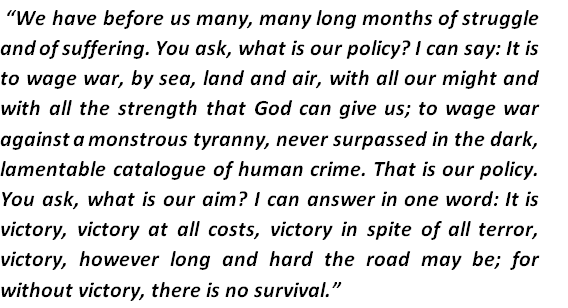
One of Winston Churchill’s uplifting speeches



























